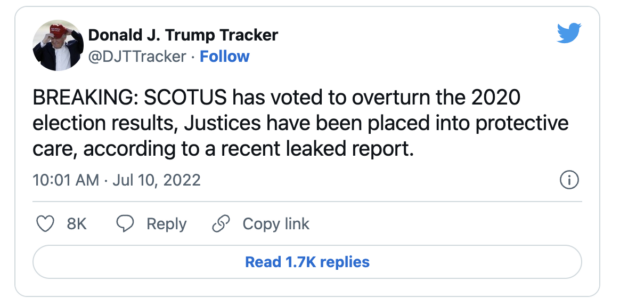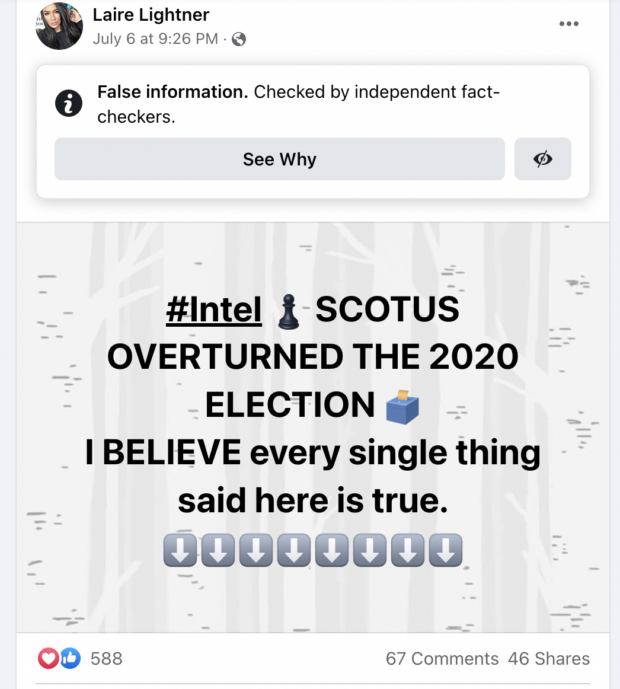No, The Supreme Court Didn't Overturn The Results Of The 2020 Election... The 2024 Election Is Still Up For Grabs
...and let's not forget about the 2000 election.

(Image via Getty)
It’s undisputed that we live in the dumbest timeline. So that means that things that really shouldn’t have to be said out loud, sometimes really do HAVE to be said out loud.
Enter the latest right-wing rumor catching on like wildfire across social media: that the Supreme Court has overturned the results of the 2020 election.

How Transactional Lawyers Can Better Serve (And Maintain) Their Clients


Of course, this is very untrue.
First of all the Court is on summer vacation — those steak dinners will not eat themselves. And there is nothing on the Court’s calendar that would indicate any case that could be construed to overturn the election results. Indeed, the legal experts are lining up to basically say “LOL”:
Sponsored

Generative AI In Legal Work — What’s Fact And What’s Fiction?


AI’s Impact On Law Firms Of Every Size


Law Firms Now Have A Choice In Their Document Comparison Software

AI’s Impact On Law Firms Of Every Size

“This claim is completely false and is patently ridiculous,” Frank S. Ravitch, Professor of Law at Michigan State University College of Law told Reuters. “There was no such case before the Court, no law that would support overturning the election, and the Court has already ended its Term until the Fall,” he added.
….
Richard Pildes, Sudler Family Professor of Constitutional Law at New York University (NYU) School of Law, told Reuters: “The Supreme Court has not – and will never – overturn the 2020 presidential election results” and that “the Court has no power to do so.”
But let’s not get too excited about the triumph of democratic elections. Remember the Supreme Court has announced they’re taking up Moore v. Harper, the North Carolina legislative maps case, which is pretty much teeing up the “independent state legislature doctrine.”
My colleague Joe Patrice detailed why this is a disaster just waiting to happen for democracy:
It means ONLY the state legislature can decide how elections work in a state. The governor and more importantly the courts have no authority to tell a legislature how elections function. When state legislatures gerrymander themselves into unrepresentative bodies and then have unreviewable power to exacerbate that advantage you see where this is going.
….
Most immediately at stake are partisan gerrymanders that lock off meaningful representation, but racial disenfranchisement or cutting off access to ballot machines in politically unfriendly areas are sitting directly off this exit ramp. States unilaterally naming alternate electors after a disagreeable presidential outcome is a little further down the road but you can see the sign from the highway.Enjoy the 2022 Midterms everyone, because this may be the last time voting has a tangible impact on government.
So yes, today’s stupid might be tomorrow’s reality. What a time to be alive.
Sponsored

The Business Case For AI At Your Law Firm


How Transactional Lawyers Can Better Serve (And Maintain) Their Clients
 Kathryn Rubino is a Senior Editor at Above the Law, host of The Jabot podcast, and co-host of Thinking Like A Lawyer. AtL tipsters are the best, so please connect with her. Feel free to email her with any tips, questions, or comments and follow her on Twitter (@Kathryn1).
Kathryn Rubino is a Senior Editor at Above the Law, host of The Jabot podcast, and co-host of Thinking Like A Lawyer. AtL tipsters are the best, so please connect with her. Feel free to email her with any tips, questions, or comments and follow her on Twitter (@Kathryn1).







